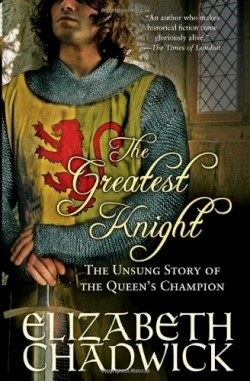The Greatest Knight
The Unsung Story of the Queen's Champion
The legendary animosity between England’s Henry II and his wife and queen, Eleanor of Aquitaine, has been featured in fiction, nonfiction, and in the film The Lion in Winter. Elizabeth Chadwick reflects that tumultuous relationship through the perspective of a man nearly lost to history, William Marshal, the fourth son of a minor noble who rose to become the most famous knight of his time, as well as tutor in martial subjects to Henry and Eleanor’s three competitive sons.
In the historical novel The Greatest Knight, author Elizabeth Chadwick shines a light on the Middle Ages—an oft-used but still seldom well-understood time. William Marshal found his calling early in life, and trained hard to become a knight worthy of the tourneys that the King of France so loved, but which his own monarch prohibited. The novel follows Marshal from the time he was sent to the court of England’s King Stephen at the age of five as an honor-hostage, to his middle years as a landed noble and family man. During that time, Marshal not only learns knightly ways, but how to survive life in a royal court as well. Chadwick portrays Marshal as an intelligent man, though illiterate, and one to whom honor means everything. The spectacle of the tournament field and the horror of the battlefield are equally evoked in this novel, which brings to vibrant life the times and troubles of a man who lived through them. Marshal, in Chadwick’s expert hands, is a man contemporary readers can easily understand and root for, much like a modern sports hero with a definite code of ethics. Chadwick admits as much in her clever Author’s Note at the end of the book.
Readers of historical fiction should certainly enjoy this novel, and even those who’ve read other novels set in the Middle Ages may learn a few things. Never stuffy or dry, The Greatest Knight provides the kind of “real life” storytelling of times past for which all historical novels should strive.
Reviewed by
J. G. Stinson
Disclosure: This article is not an endorsement, but a review. The publisher of this book provided free copies of the book to have their book reviewed by a professional reviewer. No fee was paid by the publisher for this review. Foreword Reviews only recommends books that we love. Foreword Magazine, Inc. is disclosing this in accordance with the Federal Trade Commission’s 16 CFR, Part 255.

